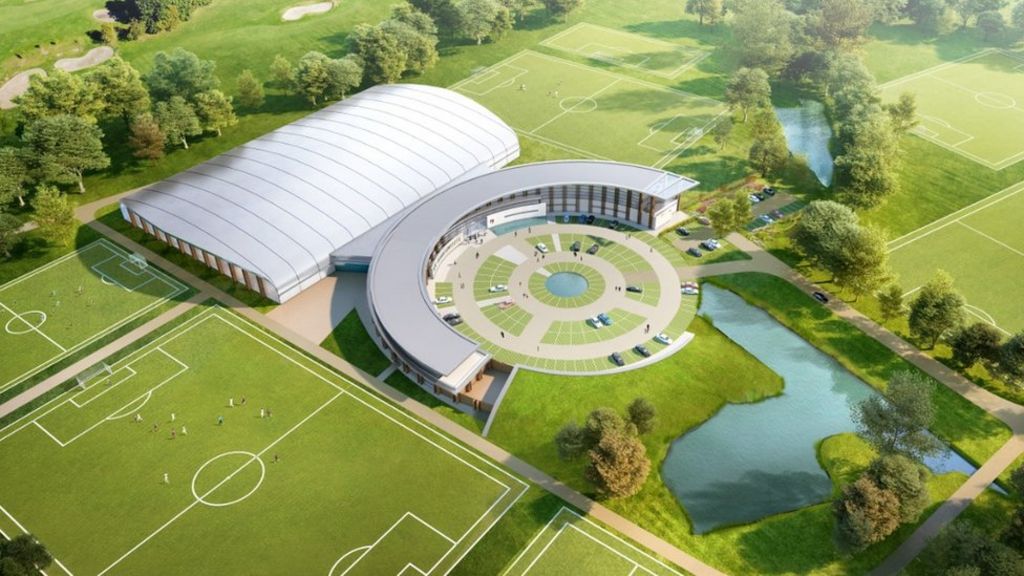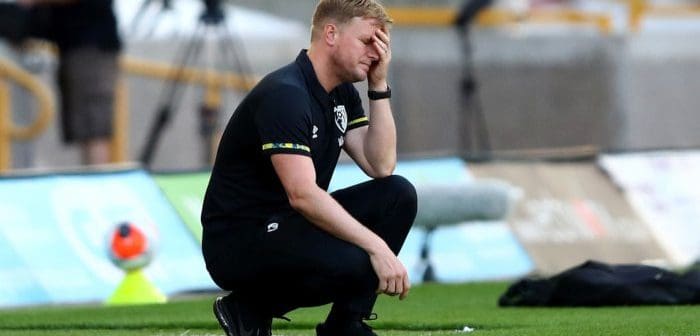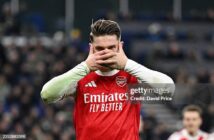Eddie Howe has got the most talented squad Bournemouth have ever had. So why has it caused him the most uncertainty?
The game against Tottenham effortlessly encapsulated the narrative that’s followed Bournemouth this season.
It was the 90th minute and a triumphant Callum Wilson wheeled off towards the emptiness intersection of the Steve Fletcher stand. The Cherries had just scored what they thought would be the winner, the result that would be the catalyst of a revival.
But Howe remained unmoved. He glanced to his right and muttered to his trusted aide, Jason Tindall. “It’s handball” he mouthed. He knew the left hand of Josh King had got the slightest of touches to Wilson’s overhead kick. A groan and a shaking of the head ensued as VAR ruled the goal offside.
John Cleese’s infamous adage of “its the hope that kills you” had never been so apt. Particuarly seven minutes later, when the palm of Hugo Lloris saved Harry Wilson’s dink; this time it was the right hand denying Bournemouth.
The 12 minutes of additional time – caused by a hefty collision on full-back Adam Smith – was a game within itself. It had chances, drama and the ever-forging feeling that this was Bournemouth’s one last hurrah at Premier League survival. It felt like the culmination of months of gambled mistakes had come home to roost.
Their performance was an excellent one. It possessed remnants of the type of football supporters hadn’t seen in months.
At the back, they picked-up their first clean sheet since mid-December, with Spurs not managing a single shot on target – the first time in their Premier League tenure Bournemouth have ever achieved such a feat. In attack, they moved the ball with purpose and speed, albeit lacking the incision to punish the sluggish visitors.
But you just got the feeling that this type of display is too little, too late. Howe’s decision to roll the dice months ago has proven futile. The house may be getting back to order, but will have to be fully built back in the Championship.
Heartbreak for Bournemouth! ?
Callum Wilson thinks he has scored a 90th minute winner but it is ruled out by VAR for handball pic.twitter.com/OeDUkOA4RN
— ᴊᴀᴄᴋ ꜱᴩᴀʀʀᴏᴡ ???? (@Jacksparrow9807) July 9, 2020
By no means should this degrade Howe. It would be all too easy to attribute Bournemouth’s mounting issues to him being overrated or out of his depth, somehow neglecting his glittering achievements over the past decade.
In reality, this season has been the first in which Howe has hit the panic button. And in doing so, making massive, potentially fatal, errors of judgement. Just like his team, the Bournemouth boss has lost his way.
Prior to this season, Howe’s pre-eminent achievements have been built upon an undeviating belief in his principles, unperturbed by form or circumstance. His continued linear success has spawned from a substance to his style, which has been continually refined through the passing of time. All the club’s age groups, from the under-7’s up to the first team, had Howe’s football ideology intrinsically sewn into them.
When it comes to the devil in the detail, this is where Howe’s expertise lay. His holistic approach ensures all players understand their roles within the side, and how their actions interconnect with a teammate. Howe doesn’t just coach a player and tell them to do something, he explains why, too.
His squad are interminably coached to have side-on body positions when receiving, even studying that the front shoulder should be directly in line with the passer. Their stance needs to be near-on identical too, taking the ball at the correct time, with a soft-cushioned back-foot touch. Howe would be known to bark and demand to start the possession drill again if body shape was not correct, first touch wasn’t exact, or passes were not punched in enough.
There is a widely told story from a couple of years ago, when Howe was so enraged at his chief midfielder Harry Arter, he confronted the player and proceeded to stop the the session to read him the riot act. It turns out Howe was furious with Arter for not carrying out a basic, mundane, possession drill which the whole academy regularly performed, to maximum intensity.

Photo: Getty Images
Howe was an up-and-comer, who drew a swell of admirers for his distinct approach to winning. Despite his relatively tender years in football management age, he had already established a proven formula of how to win games. When you turned up to the Vitality Stadium, you knew what to expect week-in, week-out.
In possession, there was overwhelming desire for ball retention dominance. By doing so, they could then perform their distinguished patterns of wide play, where overloads would incessantly occur on either flank. They would play through the thirds, with innovative, turbocharged combinations, that would split open most defences.
Out of possession, they provoked turnovers high up the pitch, suffocating opposition team’s space and initiating triggers whenever possible.
Howe was resolute in his philosophy. He would never veer away from it, there were simple non-negotiables that were a staple of every matchday, every training session. Players would either have to adjust or ship out. Belief in his methodology grew year upon year, because of the results they were getting on the pitch.
But this season, something changed. This had been the first time in Howe’s reign that the threat of regression was just too much. Everything that Howe had built, all his staunch principles, were suddenly called into question. The form and confidence of his squad was at its lowest. The man that always stuck with the plans he believed in, were mothballed.
With the threat of relegation looming, Howe panicked and and put the cards he kept so close to his chest for well over 12 years, on the table. Bournemouth would turn into a team reliant on set-pieces and exclusively play on the counter-attack.
This season, Bournemouth make on average 394 passes per game, their lowest during their top-flight history. A year earlier, they completed an upwards of 420 per 90 minutes. In fact, since promotion in the 2015/16 campaign, their passes-per-match rate has decreased year-by-year.
The Cherries are more direct with their passing than they ever have been under Howe, perhaps due to the the dwindling attacking ingenuity of the side. Their 32 goals in 34 matches means Bournemouth score a rate of 0.94 goals per game, significantly lower than last season’s 1.47. Just under half of the team’s goals (15), have come from through set-pieces. They are also 17th for shots attempted (341).

Photo: AFC Bournemouth
But in order to fully comprehend the extent of how shocking Eddie Howe’s decision to sacrifice his principles was, you need to understand the man first. “For me it means everything to stay in the Premier League,” said Howe speaking just last week. “It consumes me.”
Those last three words, in particular, are somewhat telling. The 42-year-old is a self-professed “obsessive,” who has garnered a reputation for stressing and fretting over the minutest of details. For years, he would study the foundations of his ideology, refining and reworking the slight rough edges within his footballing fundamentals.
So the swift, slightly-bombastic nature of this U-turn seemed staggering.
And the search for answers as to why Howe did this, instead of sticking loyal to his beliefs, has only inflated in recent times, as Bournemouth’s form and performances levels continue to plummet. This is exacerbated by the fact that on paper, this is Bournemouth’s most technically gifted squad. Yet, it is the worst in their Premier League history.
As noted, their performance against Spurs was an improvement to what had gone before. In truth, any showing would be a marked one compared to their last home game, a 4-1 defeat to Newcastle. It was a chastening 90 minutes that flawlessly epitomised the chasm in mood and feeling that Bournemouth once had not so long ago.
Players looked lost and so too did their manager. This was now a poor, timid caricature from the enigmatic version of Bournemouth that drew a swell of admirers for their high octane brand of football.
There are other factors too. For starters, recruitment, led incidentally by his nephew Andy Howe, has not helped. The case in point is Bournemouth’s transactions with Liverpool, where they have paid in excess of £35 million for Jordon Ibe and Dominic Solanke, the former now a free agent and Solanke yet to score a Premier League goal in 38 appearances.

Dominic Solanke (left) and Jordon Ibe (right) – Photo: Getty Images
This has resulted in a lack of competitive stimulation for the longer-term players, necessary to keep the group training at their maximum. The failure to keep building upon a small squad that had long been punching above their weight, meant they were always bound to stagnate and halt lineal progression.
As a result, Howe has changed for them, not the other way around like it had been. This squad should have the highest ceiling for Howe to achieve – from a technical point of view. But mentally, they are a far cry from the Championship-winning team that was constructed upon an innate resilience and kindred spirit.
Perhaps relations between Howe and Bournemouth has gone stale, where the same voice can no longer stimulate the squad to push to the next level, take Mauricio Pochettino at Spurs for example.
But by judging the side’s performance on Thursday night, where they could and should have won, this is likely to not be the case. Howe’s ceaseless positive reinforcements offered from the touchline seemed to provoke a response from his side, showing he still has the power to extract the former Bournemouth cornerstones his players were once built upon.
At times, they did resemble their former-selves, with Howe’s cries of “come on!” empowering his men to remain unrelentless in sheer will. But, once again, something was missing.
The ramifications of Howe’s gamble could prove damning. Recent accounts show the club are heavily reliant on Premier League broadcast revenue (£115.6 million), which accounts for 88 per cent of their overall turnover. 85 per cent of that (£110 million) goes on wages. Relying on the generous pockets of owner Maxim Denim to continue handing out money is essential. But when the club appears to be on the brink of haemorrhaging it all, that could prove difficult.
The impact of the pandemic has also contributed to the paused construction of plans to build a new training ground, worth £35 million. If they were to go down, it is understood those proposed plans would be in real danger of being shelved.

Plans for a 57-acre training ground were approved in October 2019 – Photo: AFC Bournemouth
The most sensitive consequence is for those who work for the club, of whom there are 621 of them, according to the club’s most recent accounts. It is yet unknown whether all of them would be able to retain their jobs following relegation.
And if they are to go down, Howe is expected to take the majority of the blame. But there are mitigating circumstances that do not fully lay at his door. This season, when it has rained for the Cherries boss, it has poured. Injury setbacks to key players that show no signs of slowing down, given Adam Smith was stretchered off against Spurs, have hampered any sort of mid-season revitalisation.
A strange departure from his side’s attacking instincts haven’t helped either, with striker Callum Wilson going three months without having a shot on target during the campaign. Individual mistakes, take Jefferson Lerma for Newcastle’s opener, have reared their head time and time again, too.
Bournemouth have also failed to come back in any of their 18 games when trailing, losing 16 of those and drawing just two. “It used to be the hallmark of the team, that we could find a way back,” Howe stated after the Newcastle game in June. “But when you’re not scoring goals or even creating regular chances, that then seems a long way away.”
Bournemouth are now an inconspicuous, distorted version of the ‘band of brothers’ mentality that existed among the squad a few seasons ago, the same group of players that each played a pivotal role in the club’s rise to the top-flight.

Photo: AFC Bournemouth
They were once happy-go-lucky Premier League rookies, who fought toe-to-toe with the big boys of English football. Now they re-appear as withdrawn and solemn shadows.
This season, the escalation of his side’s demise has only left Howe more inhibited as he constantly searches for answers and reflects on what has gone before. But when those answers may have just run out, you leave yourself bare for others to expose.
Howe is a good manager, who is now becoming unfairly scapegoated and written off. Time will tell if he has the energy or gusto to lead Bournemouth through, without doubt, a transitional phase next year or seek pastures new. Whatever the outcome, regrets of what could have been done differently will reign supreme.
But when results were poor, Howe jumped early and hit the panic button. And as in life, when you trepidation sets and you move away from what you are acclimatised to, anarchy ensues. The situation only worsens. And that is what’s happened for Eddie Howe and Bournemouth.
Follow us on Twitter @ProstInt
![Prost International [PINT]](https://prostinternational.com/wp-content/uploads/2021/08/PINTtFontLogoRoboto1536x78.jpg)



